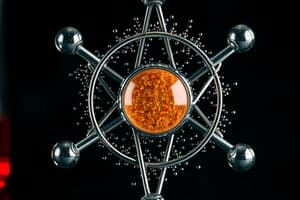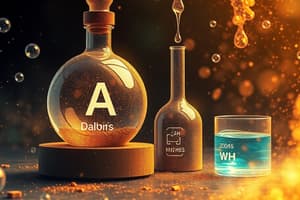Podcast
Questions and Answers
Which is not one of Dalton's hypotheses of atomic theory?
Which is not one of Dalton's hypotheses of atomic theory?
- Atoms combine in fixed ratios.
- Atoms of the same element are identical in mass and properties.
- Atoms of one element are the same as atoms of another element. (correct)
- Atoms are indivisible.
What law explains the reaction of 4.0 grams of oxygen with 3.0 grams of carbon and another set of 8.0 grams of oxygen with 3 grams of carbon?
What law explains the reaction of 4.0 grams of oxygen with 3.0 grams of carbon and another set of 8.0 grams of oxygen with 3 grams of carbon?
The law of multiple proportions
How do the masses of reactant gases compare to the products when methane is completely combusted in oxygen?
How do the masses of reactant gases compare to the products when methane is completely combusted in oxygen?
The masses of the reactants and products are equal.
Cathode rays are composed of what fundamental particle?
Cathode rays are composed of what fundamental particle?
What did the cathode ray tube experiment determine?
What did the cathode ray tube experiment determine?
What did the Millikan oil drop experiment determine?
What did the Millikan oil drop experiment determine?
Which scientist determined the charge of the electron?
Which scientist determined the charge of the electron?
Positively charged particles of radiation emitted from the decay of radioactive substances are known as:
Positively charged particles of radiation emitted from the decay of radioactive substances are known as:
What did Rutherford's gold foil experiment determine?
What did Rutherford's gold foil experiment determine?
Which scientist developed the nuclear model of the atom?
Which scientist developed the nuclear model of the atom?
Flashcards
Dalton's Atomic Theory exception
Dalton's Atomic Theory exception
Atoms of the same element are NOT the same as atoms of another element.
Law of Multiple Proportions
Law of Multiple Proportions
When elements combine, they do so in whole number ratios by mass.
Mass Conservation Combustion
Mass Conservation Combustion
In a complete combustion reaction, the mass of reactants equals the mass of products.
Cathode Ray Composition
Cathode Ray Composition
Signup and view all the flashcards
Cathode Ray Experiment outcome
Cathode Ray Experiment outcome
Signup and view all the flashcards
Millikan Oil Drop Experiment
Millikan Oil Drop Experiment
Signup and view all the flashcards
Electron Charge Scientist
Electron Charge Scientist
Signup and view all the flashcards
Alpha Particle Nature
Alpha Particle Nature
Signup and view all the flashcards
Rutherford Gold Foil Experiment
Rutherford Gold Foil Experiment
Signup and view all the flashcards
Nuclear Model Scientist
Nuclear Model Scientist
Signup and view all the flashcards
Study Notes
Atomic Theory and Dalton's Hypotheses
- Dalton proposed that atoms of one element are distinct from those of another; atoms of different elements cannot be the same.
Law of Multiple Proportions
- In two reactions, 4.0 grams of oxygen with 3.0 grams of carbon forms one compound, while 8.0 grams of oxygen with 3.0 grams of carbon forms another; this illustrates the law of multiple proportions.
Mass Conservation in Reactions
- The principle of conservation of mass states that the mass of reactant gases equals the mass of product gases in a chemical reaction.
Cathode Rays and Fundamental Particles
- Cathode rays are composed of electrons, fundamental particles identified through early experiments.
Cathode Ray Tube Experiment Findings
- The experiment confirmed the existence of electrons, advancing the understanding of atomic structure.
Millikan Oil Drop Experiment
- Millikan's experiment measured the charge of the electron, further establishing key properties of this particle.
Charge of the Electron
- Robert Millikan determined the charge of the electron through his oil drop experiment, solidifying its known properties.
Types of Radiation
- Alpha particles are positively charged radiation emitted during the decay of radioactive materials, distinct from other radiation types.
Rutherford's Gold Foil Experiment
- Rutherford's experiment revealed that most of an atom's space is empty, with a dense nucleus containing protons and neutrons at its core.
Nuclear Model of the Atom
- Ernest Rutherford developed the nuclear model of the atom, revolutionizing the understanding of atomic structure by demonstrating the nucleus's role.
Studying That Suits You
Use AI to generate personalized quizzes and flashcards to suit your learning preferences.




